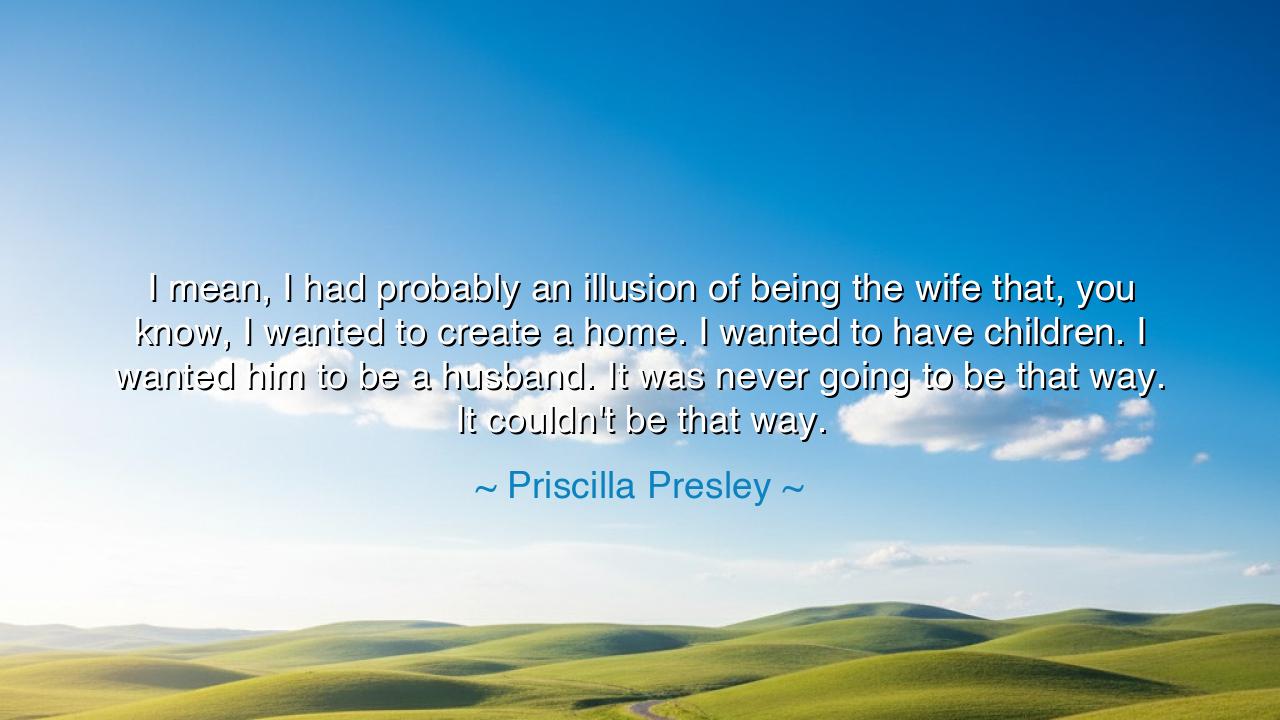
I mean, I had probably an illusion of being the wife that, you
I mean, I had probably an illusion of being the wife that, you know, I wanted to create a home. I wanted to have children. I wanted him to be a husband. It was never going to be that way. It couldn't be that way.






In the dim chambers where memory meets desire, Priscilla Presley gives us a truth that sounds like a bell struck at dusk: “I had probably an illusion of being the wife that, you know, I wanted to create a home. I wanted to have children. I wanted him to be a husband. It was never going to be that way. It couldn’t be that way.” Hear the cadence—want, want, want; then the stone-firm never and couldn’t. This is the passage from dream to daylight, from the fresco of hope to the bare wall of what is. She names not only a private disappointment, but a universal crossing: the moment when we discover that love cannot carry the weight of a life imagined for someone who cannot inhabit it.
Mark the heart of the saying. An illusion is not a lie we tell on purpose; it is a mirage conjured by heat and hunger. To be the wife who would create a home, to cradle children, to receive a partner as true husband—these are noble longings. But even noble longings become idols when they are placed upon a person who is shaped by other vows, other wounds, other weather. The wisdom here is not cynicism; it is clarity. The beloved may be dazzling and dear—and still unable to dwell within the architecture we built for them in our minds.
The origin of this quote rises from a life lived in the glare of legend, where a single man was required to be music for the world and hearth for one household at once. In such gravity, orbits distort. Priscilla’s words carry the ache of discovering that fame, fatigue, and a restless spirit can make the common gifts—quiet dinners, shared chores, simple proximity—scarce as rain in a desert. She does not deny love; she laments mismatch. “It was never going to be that way” moves beyond blame to diagnosis: the structure itself could not stand; the beams were cut from different woods.
History keeps a mirror for this lesson. Consider Héloïse and Abelard—he, mind on fire; she, brilliance and devotion bound within cloister and controversy. Their letters unfold the same tension: yearning to create a home of thought and love, yet pressed by forces that made the ordinary grammar of marriage impossible. Or think of a famed general’s spouse in any age: the tent moves, the trumpet calls, and the cradle must rock without him. In each tale, tenderness is real—and yet the role of husband as daily companion remains out of reach. The house built in hope becomes a shrine to what cannot be lived.
There is mercy hidden in Priscilla’s confession. By naming the illusion, she lets others lay theirs down gently. She reminds us that the most dangerous fantasies are not the wild ones; they are the respectable ones we refuse to test against reality. We imagine that if we love harder, schedule better, keep quieter, try one more time, the river will reverse its flow. But rivers obey gravity, not pleading. When she says, “It couldn’t be that way,” she invites us to trade stubbornness for wisdom, nostalgia for honest grief, and then—after the mourning—to begin again with eyes open.
From this, a lesson to pass to the next generation: build the life you desire with a person who can dwell inside it. Do not marry a motif, or a public flame, or a promise made to the crowd. Seek someone whose daily rhythm aligns with the home you hope to create—whose hands will fold laundry as readily as they lift you in praise, whose heart can hold both children and storms without vanishing into the night. And if you find yourself clutching an illusion, release it with dignity; better a clean sorrow than a gilded cage.
Practical rites for the road: (1) Before vows, write a one-page portrait of your ordinary week—meals, rest, work, friendship, faith—and ask the other to do the same; compare the pages, not just the chemistry. (2) Test for reciprocity in small things: who initiates repair, who keeps time, who carries the mental load; daily patterns reveal future peace or future ache. (3) Ask futures-facing questions—about travel, privacy, substance use, money, caretaking, fame or ambition—and believe the answers. (4) Notice “never” and “can’t” when they appear; treat them as structural truths, not hurdles to be conquered by romance. (5) If a mismatch is clear, choose release early; honor what was good, forgive what could not be given, and walk toward a life that fits. Do these, and your hope will become a house with doors that open, windows that breathe, and a table where love can sit down and stay.






AAdministratorAdministrator
Welcome, honored guests. Please leave a comment, we will respond soon